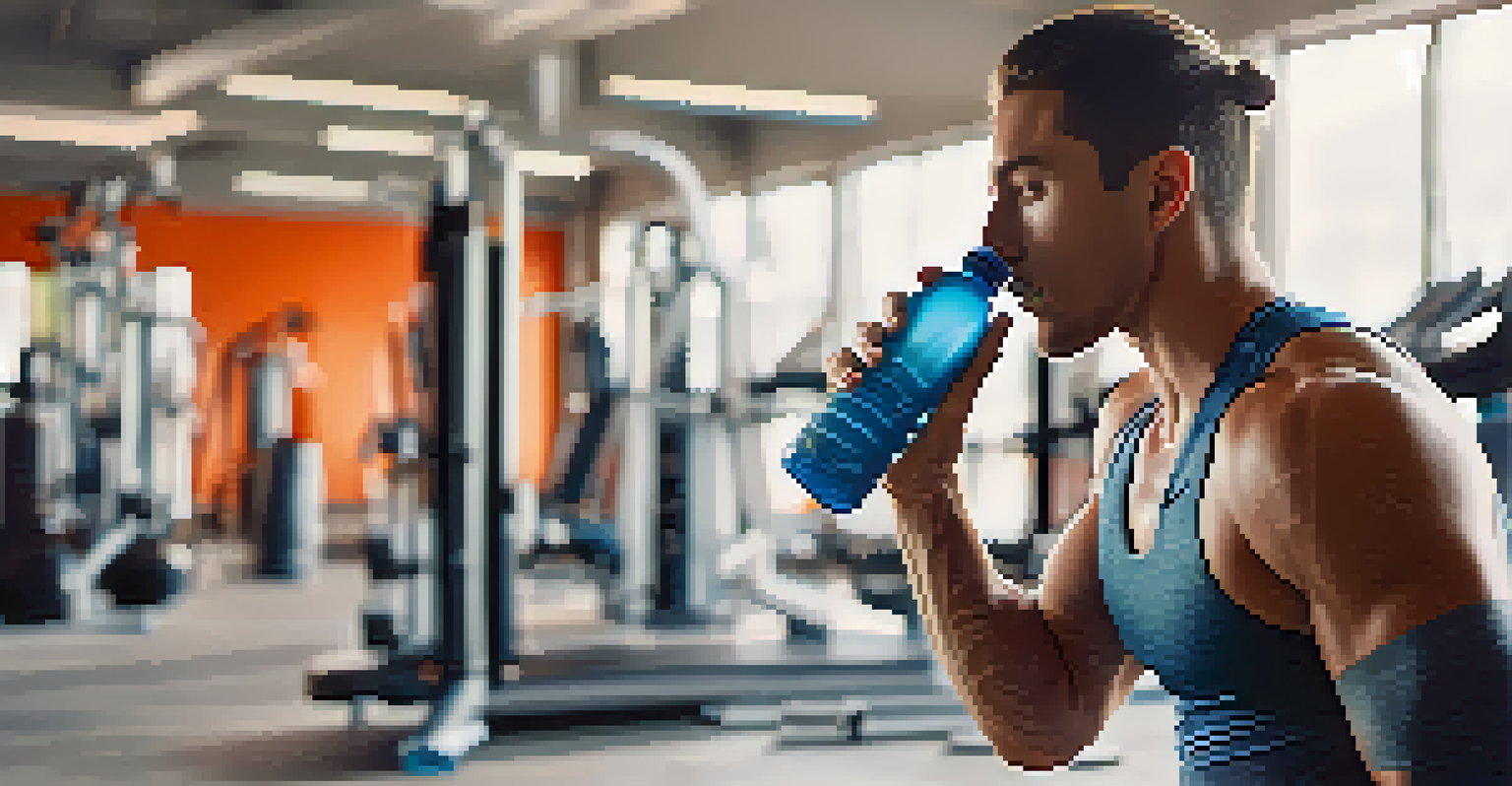Hydration Strategies: Boost Recovery with Proper Fluid Intake

Understanding the Importance of Hydration for Recovery
Hydration plays a crucial role in recovery, especially after exercise. Our bodies lose fluids through sweat, breathing, and even digestion, making it essential to replenish what’s lost. Staying hydrated not only helps with physical recovery but also supports mental clarity and energy levels.
Water is the driving force of all nature.
When you hydrate properly, you enhance your body’s ability to repair muscles, replenish energy stores, and maintain optimal performance. Dehydration, on the other hand, can lead to fatigue, muscle cramps, and prolonged recovery times. So, understanding how hydration impacts your recovery is the first step towards effective strategies.
Think of hydration as the fuel for your recovery engine. Just as a car needs gas to run smoothly, your body requires adequate fluids to function at its best post-exercise. The right amount of hydration can make all the difference in how quickly you bounce back.
Signs of Dehydration: Know When You Need More Fluids
Recognizing the signs of dehydration is key to maintaining your hydration levels. Common indicators include thirst, dry mouth, fatigue, and dark yellow urine. If you notice any of these signs, it’s a clear signal that your body needs more fluids.

In more severe cases, dehydration can manifest as dizziness, confusion, or rapid heartbeat. These symptoms can hinder your recovery and performance, underscoring the importance of listening to your body. Staying attuned to these signals can help you prevent dehydration before it becomes a bigger issue.
Hydration is Key for Recovery
Proper hydration enhances muscle repair and energy replenishment, making it essential for effective recovery after exercise.
Imagine your body as a plant; without enough water, it wilts and struggles to thrive. Just like a plant needs consistent watering, your body requires regular fluid intake to stay healthy and recover effectively.
Optimal Hydration Strategies for Athletes
For athletes, proper hydration isn’t just a post-workout concern; it’s a continuous process. One effective strategy is to drink water regularly throughout the day, not just during workouts. This ensures your body is primed for performance and recovery.
Hydration is key. It’s the difference between success and failure.
Incorporating electrolyte-rich fluids can also enhance recovery, especially after intense workouts. Electrolytes like sodium, potassium, and magnesium help maintain fluid balance and prevent cramping. Sports drinks or coconut water can be great options to replenish lost electrolytes.
Think of hydration as a puzzle; each piece—water, electrolytes, and timing—fits together to create a complete picture of recovery. By strategically planning your fluid intake, you can optimize your recovery and overall well-being.
Hydration Before, During, and After Exercise
Timing your hydration is just as important as how much you drink. It’s recommended to start hydrating well before your workout, aiming for at least 16-20 ounces of water a couple of hours prior. This prepares your body and helps prevent dehydration during exercise.
During your workout, aim to sip on fluids every 15-20 minutes, especially if you’re exercising for over an hour. This consistent intake can help maintain your energy levels and performance. If you're sweating heavily, consider integrating a sports drink to replenish lost electrolytes.
Recognize Dehydration Signs
Understanding signs of dehydration, such as fatigue and dry mouth, is crucial to maintaining optimal hydration levels.
After your workout, replenish the fluids you’ve lost. A good rule of thumb is to drink 16-24 ounces of water for every pound lost during exercise. By strategically hydrating at these key times, you set yourself up for a faster recovery.
Choosing the Right Fluids for Recovery
Not all fluids are created equal when it comes to recovery. Water is essential, but incorporating beverages like coconut water, herbal teas, and smoothies can provide added benefits. These options often contain vitamins and minerals that aid in recovery.
While sports drinks can be beneficial, especially during intense workouts, be mindful of their sugar content. Opt for options with natural ingredients and lower sugar levels to avoid unnecessary calories. The goal is to hydrate without overloading your body with sugar.
Consider your recovery drink as a nourishing meal rather than just a thirst quencher. Just as you would choose nutrient-dense foods for recovery, select fluids that contribute to your overall health and recovery goals.
Hydration Myths: Debunking Common Misconceptions
There are many myths surrounding hydration that can cloud our understanding. For example, some believe that drinking a lot of water at once is the best approach, but this can actually lead to imbalances. Instead, regular small sips throughout the day are more effective.
Another common misconception is that coffee and tea are dehydrating. While caffeine can have a mild diuretic effect, moderate consumption doesn’t significantly impact hydration levels. In fact, these beverages can contribute to your overall fluid intake.
Choose Fluids Wisely
Selecting fluids that include electrolytes and nutrients can significantly support recovery and overall health.
By debunking these myths, we can make informed decisions about our hydration habits. Just like separating fact from fiction in any area of life, understanding the truth about hydration can empower you to take better care of your body.
Tracking Your Hydration: Tools and Tips
Keeping track of your fluid intake can be a game-changer for your recovery. There are numerous apps available that can help you monitor your hydration levels throughout the day. These tools can remind you to drink water and log your intake, making it easier to stay on top of your hydration goals.
Another simple method is to carry a reusable water bottle with measurement markers. This not only encourages you to drink more but also visually tracks your progress. Having a tangible reminder can boost your motivation to stay hydrated.

Think of tracking your hydration like keeping a journal of your wellness journey. By being mindful of your fluid intake, you can better understand your body’s needs and optimize your recovery process.